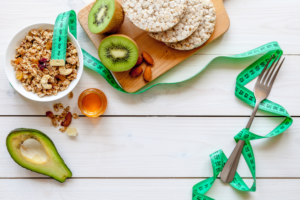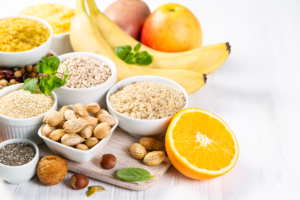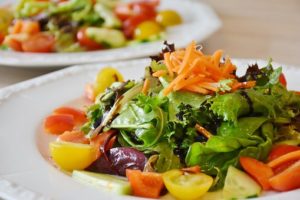Weight loss is the first thing that comes to our mind when we come across the term ‘dieting’. People often live with a misconception that dieting refers to starving your body until you reach your desired goal. Similarly, there are lots of myths regarding dieting and weight loss which usually people don’t judge with a proper clarification or facts behind those myths. But starving and not following the proper dieting rules will only lead you to a disastrous health condition, with some incurable health diseases. So, it is best to follow the proper dieting guidelines according to the requirement of your body.

There are numerous myths regarding weight loss and dieting you might bump into in your everyday life from different sources. Let’s look into some very popular myths of dieting and weight loss, and also know the facts behind them.
Myth # 1
Having food with short intervals or after every 3 hours interval will boost your metabolism rate.
Fact:

Your metabolism rate neither depend upon the number of meals you take in a day, nor does it depend on at what intervals you are taking them. The facts that will reflect on your metabolism rate are the total number of calories you are consuming in a day, and the level of your activities throughout the day. You can have your meals in your suitable time and quantity adjusting the distribution of the total number of calories in your meals you are supposed to take in a day. So, the number of meals and the intervals between the meals are not important. Important is maintaining the macro nutrients and calorie distribution according to your diet chart. But yes, eating smaller meals at short intervals helps you feel less hungry before your main meals, which helps you to avoid larger consumption of food. This will contribute you to avoid weight gain, but not in boosting your metabolism rate.
Reference:
www.ncbi.nlm.nih.gov/pubmed/9155494
Myth # 2
Breakfast like a king lunch like a prince and dine like a pauper. Eating rice at dinner will make you fat.
Fact:
As mentioned earlier, gaining and losing weight depends upon the total calorie intake in a day. Eating less or lighter meals for dinner won’t help you loose weight if you eat more than your required calories during the day. Rather, some studies show that, consuming carbohydrates at dinner helps you burn fat better.
Reference:
www.ncbi.nlm.nih.gov/pubmed/21475137
Myth # 3
Breakfast is the most important meal of your day
Fact:
There is no doubt that breakfast is very important meal of the day. It is also advisable to avoid skipping breakfast, as there a number of health benefits of starting your day with a healthy breakfast.
But if your diet chart focuses more on fat loss, that it is helpful to some extent to skip this meal. In this case, dinner is more important than the morning meal. Intermittent fasting diet charts does not include breakfast. Rather, it helps to make your immune system better.
Reference:
https://www.ncbi.nlm.nih.gov/pubmed/28063876
Myth # 4
Protein supplement can lead to potential health risk on kidney function
Fact:
Protein supplement does not lead you to kidney damage. Rather, drinking less water and following an unhealthy lifestyle will lead you to numerous health diseases including kidney dysfunction. But that does not mean that, you can take protein supplements without your doctor’s advice. Follow the suggested diet chart by your nutritionist and stay hydrated to avoid the unwanted health problems.
Reference:
https://www.ncbi.nlm.nih.gov/pubmed/10722779
Myth # 5
You have to take fat burner supplements to reach your desired fitness goal
Fact:
As long as you are under a proper fitness training program, following every details of your fitness chart, you don’t necessarily have to take any fat burner supplements to reach your goal. You just have to make sure that your body is getting all the necessary micro and macro nutrients from your diet.
Myth # 6
Afternoon nap will make you fat
Fact:
If your food consumption does not exceed your TDEE (Total Daily Energy Expenditure), you won’t get fat. Our body’s hormonal balance depends on sleep. Therefore, a 7-8 hour sleep everyday is very essential, especially during night. If you do not sleep well and sufficiently at night, naps during the day won’t help you much to overcome the lack of sleep you have. Insufficient sleep may lead to several discomforts to your body. and this may only have some adverse effects on your journey of weight loss.
Myth # 7
Sweating is the indicator of calorie burn. No sweat means no calorie burn, no fat burn.
Fact:
Sweating is our body’s natural way of regulating body temperature. Water and salt are released by it, which evaporates to help cool our body. Sweating itself doesn’t burn any of your calories. Energy and calorie burn depends on how much a person works out at a certain period of time, regarding the facts such as the person’s weight, height, workout intensity, etc. calories can be burnt even if you choose activities that doesn’t sweat you much, or at all. For example, swimming, lifting light weights, or exercising in a cooler environment will burn the same number of calories as it would bur in summer. so, you can switch on the fan or air conditioner of your room during the workouts. Keep in mind, excessive sweating can lead you to dehydration which will cause you lots of health problems.
Reference:
https://www.healthline.com/health/does-sweating-burn-calories
Myth # 8:
Dieting means boring food, boiled veggies and living on salads
Fact:

Dieting means consuming adequate foods meeting the daily requirements of micro and macro nutrients for our body. Dieting does not imply to eating boiled foods avoiding all types of oil and spices. You can add your preferred spices to your cooking. You can also use healthy oil for cooking balancing the macro ratio of your diet chart. Instead of eating boring foods, you can enjoy your meals by adding food items and cooking them in healthy ways by balancing nutrient requirements of your body.
Myth # 9:
Eating egg yolks will lead you to weight gain
Fact:
An egg yolk does contain cholesterol, but dietary cholesterol does not have a direct impact on blood cholesterol. Egg yolk helps to increase HDL (High-Density Lipoprotein), which is considered as good cholesterol, in our body. Egg yolks does not increase bad cholesterol levels in your body, rather trans fat and excess refined sugar can lead to increase in bad cholesterol.

Wow!
Very much informative and useful too!
Thanks Labanya. Stay in touch to know more about healthy living and live better.
Thanks for the sharing this . It is helpful and informative. I loved the way things are organised here. For sure i am going to follow this.
Thanks Ucchash. Keep in touch to know more about healthy living.
Wow !! Thnx for information..